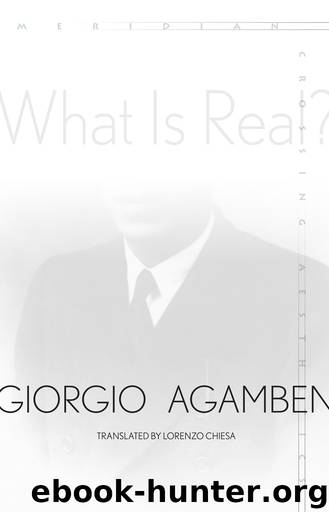What Is Real? by Giorgio Agamben

Author:Giorgio Agamben [Agamben, Giorgio]
Language: eng
Format: epub
Publisher: Stanford University Press
Published: 2018-11-22T16:00:00+00:00
The Value of Statistical Laws in Physics and Social Sciences
By Ettore Majorana
translated by Rosario Nunzio Mantegna
1. THE CONCEPT OF NATURE ACCORDING TO CLASSICAL PHYSICS
The study of the true or hypothetical relations between physics and other sciences has always been of notable interest due to the special influence that physics has played on the general course of scientific thought in modern times. It is known that the laws of mechanics have been seen for a long time as the ultimate kind of human knowledge about nature. Many scholars have also believed that the imperfect notions of other sciences should eventually be related back to the kind of notions observed in mechanics. The above concept justifies the study we consider here.
The exceptional credit of physics evidently comes from the discovery of the so-called exact laws. These laws consist of relatively simple formulas, originally “excogitated” starting from fragmentary and approximate empirical indications, which turn out to be of universal validity both when these laws are applied to new orders of phenomena and when the progressive improvement of the art of experiments allows one to verify them in a more and more rigorous way. It is known to everybody that according to the fundamental concept of classical mechanics the motion of a physical body is completely determined by the initial conditions (position and velocity) of the body and by the forces that are applied to it. On the nature and size of forces that may be present in material systems, the general laws of mechanics state only some condition, or limitation, that always must be verified. Such a characteristic, for example, has the principle of action and reaction. To this principle one has added, more recently, other general rules such as the ones concerning constrained systems (principle of virtual work) or elastic reactions and, even more recently, the mechanical interpretation of heat and also the energy conservation principle, which is seen as a general principle of mechanics. Apart from these general indications, it is however a special task of physics to discover, case by case, all that is needed to effectively apply the principles of dynamics, which is the knowledge of all forces acting in the system being investigated.
In one case, however, it has been possible to find the general expression for forces that are present between material bodies. This occurs in the case where material bodies are isolated one from the other and therefore the forces are reciprocally acting at distance only. In this last case, if we do not consider electromagnetic forces, which were discovered in the nineteenth century and which manifest themselves only under specific conditions, the only force acting is the force of gravitation, whose notion was suggested to Newton from the mathematical analysis of the Keplero laws. The Newton law is typically applicable to the study of the motion of celestial bodies, which being separated by immense empty spaces can indeed influence each other only through action at a distance. As is known, this law is indeed sufficient to predict in any aspect and with a beautiful accuracy the complex dynamics of our planetary system.
Download
This site does not store any files on its server. We only index and link to content provided by other sites. Please contact the content providers to delete copyright contents if any and email us, we'll remove relevant links or contents immediately.
Enlightenment Now: The Case for Reason, Science, Humanism, and Progress by Steven Pinker(7303)
A Journey Through Charms and Defence Against the Dark Arts (Harry Potter: A Journey Through…) by Pottermore Publishing(4795)
The Immortal Life of Henrietta Lacks by Rebecca Skloot(4570)
A Journey Through Divination and Astronomy by Publishing Pottermore(4373)
Elon Musk by Ashlee Vance(4115)
Origin Story: A Big History of Everything by David Christian(3679)
COSMOS by Carl Sagan(3615)
Alchemy and Alchemists by C. J. S. Thompson(3506)
Bad Pharma by Ben Goldacre(3415)
Enlightenment Now by Steven Pinker(3363)
Shadow of Night by Deborah Harkness(3350)
Inferior by Angela Saini(3308)
A Mind For Numbers: How to Excel at Math and Science (Even If You Flunked Algebra) by Barbara Oakley(3290)
Origin Story by David Christian(3191)
The Code Book by Simon Singh(3167)
Signature in the Cell: DNA and the Evidence for Intelligent Design by Stephen C. Meyer(3122)
The Elements by Theodore Gray(3048)
A Brief History of Time by Stephen Hawking(3013)
A Journey Through Potions and Herbology (A Journey Through…) by Pottermore Publishing(2843)
